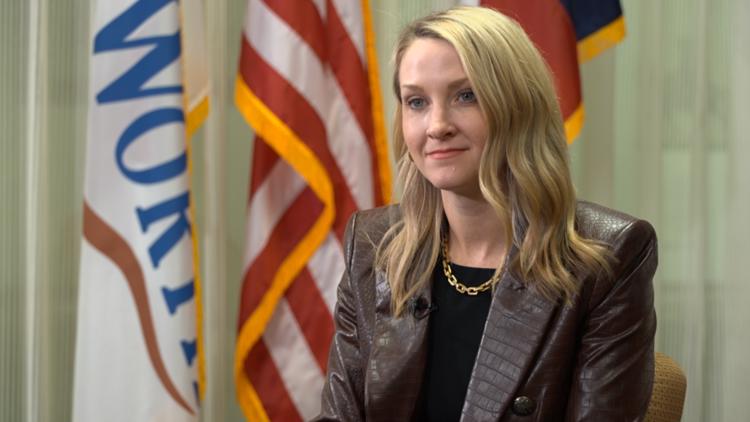Fort Worth Mayor Matty Parker: There Are Racial Divides on Policing

Fort Worth community advocates and city leaders have been arguing for years about creating a police oversight board similar to the one in Dallas.
Fort Worth, Texas. One of the most contentious issues in Fort Worth politics is how to improve police performance.
In November, the Fort Worth City Council narrowly rejected a plan to create a police review board.
In December, the city saw former Fort Worth police officer Aaron Dean convicted of manslaughter for the 2019 shooting and murder of Atatiana Jefferson at her home.
Then on Tuesday, Police Chief Neil Noakes unveiled his version of a plan to raise awareness of police work.
There is a strong focus on increased accountability and transparency in policing in Fort Worth that will never go away.
Fort Worth Mayor Matty Parker met with the WFAA to discuss the Citizens Review Board, race and policing in the city, and her response to the dean’s trial.
“I think to be a good mayor, you have to stand up for the police and the community at the same time,” Parker said.
She is attempting to follow this path, but has come under fire after she voted to reject a police oversight board.
“Honestly, I don’t regret my vote,” Parker said. “What I had to do as mayor was to talk to my community and say that now is not the right time to do this in the midst of the election season in November, before the trial for the murder of Atatiana Jefferson, it was not the right time to do so. “
Lawyers are pushing for a review board following the Fort Worth mother’s viral arrest seven years ago. The arrest led to the creation of a race and culture task force that provided the city with a number of recommendations, including a police oversight council.
After a year of work and adjustments to how the board would work, the vote fell 5–4 after Parker did not vote along with council members Carlos Flores, Michael Crane, Alan Blaylock and Leonard Firestone.
She emotionally referred to Jefferson’s death during a discussion of the vote, saying that she did not think Jefferson would have died the same way had she lived next door to Parker.
“If the same thing happened in my house, I thought maybe these officers would knock on the door first and ask questions,” Parker told WFAA.
She hasn’t spoken about the trial since Dean was sentenced to 11 years, 10 months and 12 days in prison.
“This has been an incredibly difficult time for me personally and for our city,” Parker said. “In the end, no one really won, the life of a young woman is tragically lost. Her dreams will never come true and her family has completely fallen apart due to her death.”
Instead of an oversight board, the city created the office of a police monitor in 2020 and hired Kim Neil to fill the role. The office worked to build community relations without face-to-face contact during the peak of the COVID-19 pandemic and handled 41 police complaints last year, up from 16 in 2021.
Neil recently left town for a similar role in Arlington, Virginia. In a WFAA exit interview, she said she felt a racial divide in Fort Worth.
“There is a racial divide when it comes to policing. I really feel a lot about this,” Neil said. “We have different communities that have different experiences with the police.”
“I believe it’s true,” Parker said. “If someone feels like they are being guarded too much and that causes a lack of trust in their communities, but at the same time they know they need police in their communities.”
On Tuesday, Chief Noakes unveiled a new board plan that would recommend policies and procedures but would investigate complaints and Noakes would nominate members. He submitted 13 names of people wishing to take on the roles.
Several city council members have opposed the idea, as community leaders have been pushing for a replacement for the supervisory board for several years.
Council member Gina Bivens called it a “slap in the face”.
“Unfortunately, the wishes of the people, the Race and Culture Working Group, who called for an oversight committee, were ignored,” Bivens said.
Parker calls this a positive step and says the police are already looking into the situation.
“The job feels really thankless at times, and it’s an incredibly dangerous job, and in the blink of an eye, your whole life can change depending on the decision you make,” she said. “The police profession has now become probably the most researched, closely monitored and trained profession in the entire country.”
Noakes presented the committee as an option that could exist alongside an additional oversight board, but the oversight board has already been criticized for not being unnecessary due to the police monitor’s role.
“Now I can tell you what my concerns are,” Parker said. I think there is a lot of redundancy and perhaps the creation of another task force, another committee.”
Parker believes that the trust gap is closing, and that it will take the entire city, not just the police, to fully restore it.
“We probably shouldn’t call them high crime areas,” she said. “We call them neighborhoods that have been in need of investment for decades, and the city government has a responsibility to think comprehensively about the needs of the city.”
Dallas Press News – Latest News:
Dallas Local News || Fort Worth Local News | Texas State News || Crime and Safety News || National news || Business News || Health News
texasstandard.news contributed to this report.










